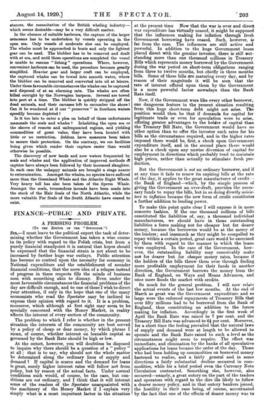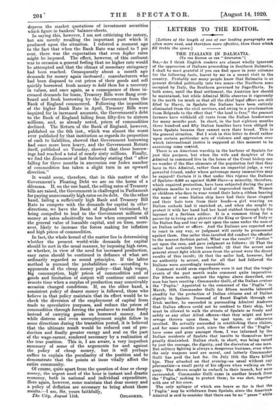FINANCE—PUBLIC AND PRIVATE.
A PRESSING PROBLEM.
[TO THE EDITOR, OP THE " SPECTATOR "]
Sm,—I must leave to the political expert the task of deter- mining whether the Government has taken a wise course in its policy with regard to the Polish crisis, but from a purely financial standpoint it is natural that hopes should be expressed that the financial strain is not about to be increased by further huge war outlays. Public attention has become so centred upon the necessity for economy in National expenditure and the establishment of sounder financial conditions, that the mere idea of a relapse instead of progress in these respects fills the minds of business men with something akin to dismay. Even under the most favourable circumstances the financial problems of the day are difficult enough, and to one of these I wish to direct your attention, if only in the hope that one of the many economists who read the Spectator may be inclined to express their opinion with regard to it. It is a problem, moreover, which although at first sight may seem to be specially concerned with the Money Market, in reality affects the interest of every section of the community.
The problem to which I refer is whether in the present situation the interests of the community are best served by a policy of cheap or dear money, by which phrase I mean, of course, whether interest on loanable capital as governed by the Bank Rate should be high or low.
At the outset, however, you will doubtless be disposed to inquire why there should be a question of a " policy " at all ; that is to say, why should not the whole matter be determined along the ordinary lines of supply and demand ? If capital is scarce and the demand for loans is great, surely higher interest rates will follow not from policy, but by reason of the actual facts. Under normal conditions such would, of course, be the case, but con- ditions are not ordinary, and I think that it will interest some of the readers of the Spectator unacquainted with the machinery of the Money Market if I .explain very simply what is a most important factor in the situation at the present time Now that the war is over and direct war expenditure has virtually ceased, it might be supposed that the influences making for inflation through fresh Government borrowing have ceased. Such, however, is far from the case. The influences are still active and powerful. In addition to the huge Government loans placed direct with the genuine investor, there is still out- standing more than one thousand millions in Treasury Bills which represents money borrowed by the Government during the war period on short-term obligations ranging from three to twelve months, but chiefly in three months bills. Some of these bills live maturing every day, and by reason of their magnitude it will be seen that the rate of interest offered upon them by the Government is a more powerful factor nowadays than the Bank Rate itself.
Now, if the Government were like every other borrower, one dangerous feature in the present situation resulting from this huge short-term debt might not arise. The position would then be that if demands for capital for legitimate trade or even for speculation were to arise, offering greater advantages to the holder of capital than the Treasury Bill Rate, the Government would have no other option than to offer the investor such rates for his bills as the circumstance required, and in the higher rates imposed there would be, first, a check upon Government expenditure itself, and in the second place th ere would also be a check upon any unwise diversion of capital for employment in directions which probably tend to maintain high prices, rather than actually to stimulate fresh pro- duction.
But the Government ir. not an ordinary borrower, and if at any time it fails to renew its expiring bills at the rate of the day, it applies to the great manufacturer of credit— the Bank of England—which, by the simple process of giving the Government an over-draft, provides the neces- sary funds to repay the bills, but in so doing directly minis- ters to inflation because the new form of credit constitutes a further addition to lending power.
To make this point quite clear I will express it in more concrete fashion. If the one thousand millions of bills constituted the liabilities of, say, a thousand individual manufacturers, we should have in those outstanding liabilities a force making not for cheaper but for dearer money, because the borrowers would be at the mercy of the lenders ; and inasmuch as they might be compelled to repay within a certain period, great care would be exercised by them with regard to the manner in which the loans were employed. In the case of the Government, how- ever, the outstanding liability may conceivably make not for dearer but for cheaper money rates, because if the holders of the bills throw them over through finding more profitable employment for their funds in another direction, the Government borrows the money from the Bank of England, on Ways and Means Advances, and once more floods the market with credits.
So much for the general problem. I will now relate the actual events of the last few months. At the end of March so great was the Government expenditure and so large were the enforced repayments of Treasury Bills that over fifty millions had to be borrowed from the Bank of England, thus constituting an addition to the forces making for inflation. Accordingly in the first week of April the Bank Rate was raised to 7 per cent. and the Treasury Bill Rate was advanced to 61 per cent. Moreover, for a short time the feeling prevailed that the natural laws of supply and demand were at length to be allowed to operate and the Bank Rate raised to such a level as the circumstances might seem to require. The effect was immediate, and elimination by the banks of all speculative applications for loans became the order of the day. Those who had been holding up commodities on borrowed money hastened to realize, and a fairly general and in some directions a fairly substantial decline occurred in com- modities, while for a brief period even the Currency Note Circulation contracted. Something else, however, also occurred—namely, a great outcry on the part of the traders and operators with regard to the dire ills likely to follow a dearer money policy, and in that outcry bankers joined, the hostility in their case being, of course, accentuated by the fact that one of the effects of dearer money was to depress the market quotations of investment securities which figure in bankers' balance-sheets. In saying this, however, I am not criticizing the outcry, but am merely recalling the important part which it produced upon the situation. I referred a moment ago to the fact that when the Bank Rate was raised to 7 per cent. there was the expectation that even higher rates might be imposed. The effect, however, of this outburst was to occasion a general feeling that no higher rate would be attempted and that the climax of monetary stringency had been reached. Consequently about a month ago demands for money again increased ; manufacturers who had been disposed to cut prices of their goods and sell quickly borrowed fresh money to hold them for a recovery in values, and once again, as a consequence of these in- creased demands for loans, Treasury Bills were flung over- board and fresh borrowing by the Government from the Bank of England commenced. Following the imposition of the higher Bank Rate in April, Treasury Bills were inquired for in increased amounts, the Government's debt to the Bank of England falling from fifty-five to sixteen millions, and, as already noted, prices of commodities declined. The Return of the Bank of England, however, published on the 6th inst., which was almost the worst ever published by that institution as regards its proportion of cash to liabilities, showed that Government borrowing had once more been heavy, and the Government Return itself, published on Tuesday, showed that these borrow- ings had reached a total of nearly sixty millions. Finally, we find the Economist of last Saturday stating that " after falling for three months in succession our Index number of commodities has taken a slight turn in an upward direction."
It would seem, therefore, that in this matter of the Government's Floating Debt we are on the horns of a dilemma. If, on the one hand, the selling rates of Treasury bills are raised, the Government is challenged in Parliament for paying unnecessarily high rates on its debt. On the other hand, failing a sufficiently high Bank and Treasury Bill Rate to compete with the demands for capital in other directions, we have the Bank of England victimised, by being compelled to lend to the Government millions of money at rates admittedly too low when compared with the general value of loanable capital, and on lines, more- over, likely to increase the forces making for inflation and high prices of commodities.
In fact, the whole kernel of the matter lies in determining whether the present world-wide demands for capital should be met in the usual manner, by imposing high rates, or whether, in view of the need ior increased production, easy rates should be continued in defiance of what are ordinarily regarded as sound principles. If the latter method is pursued the probabilities are—according to opponents of the cheap. money policy—that high wages, big consumption, high• prices of commodities and of goods and limitation of output will continue until some remote time when a surplus of production may conceivably occasion changed conditions. If, on the other hand, a consistent policy of dearer money is followed, those who believe in that policy maintain that its effect would be to check the diversion of the employment of capital from trade to speculative purposes, and reduce the prices of commodities through forcing the producer to realize freely instead of carrying goods on borrowed money. And while distress and even unemployment might follow in some directions during the transition period, it is believed that the ultimate result would be reduced cost of pro- duction and finally greater energy and zeal on the part of the wage-earner, rendered necessary by a realization of the true position. This is, I am aware, a very imperfect summary of some of the arguments for and against the policy of cheap money, but it will perhaps suffice to explain the peculiarity of the position and to demonstrate that the points at issue vitally affect the entire community. Of course, quite apart from the question of dear or cheap money, the urgent need of the hour is instant and drastic economy, both in national and individual expenditure. Here again, however, some maintain that dear money and a policy of deflation are necessary to bring about those results.—I am, Sir, yours faithfully,



































 Previous page
Previous page